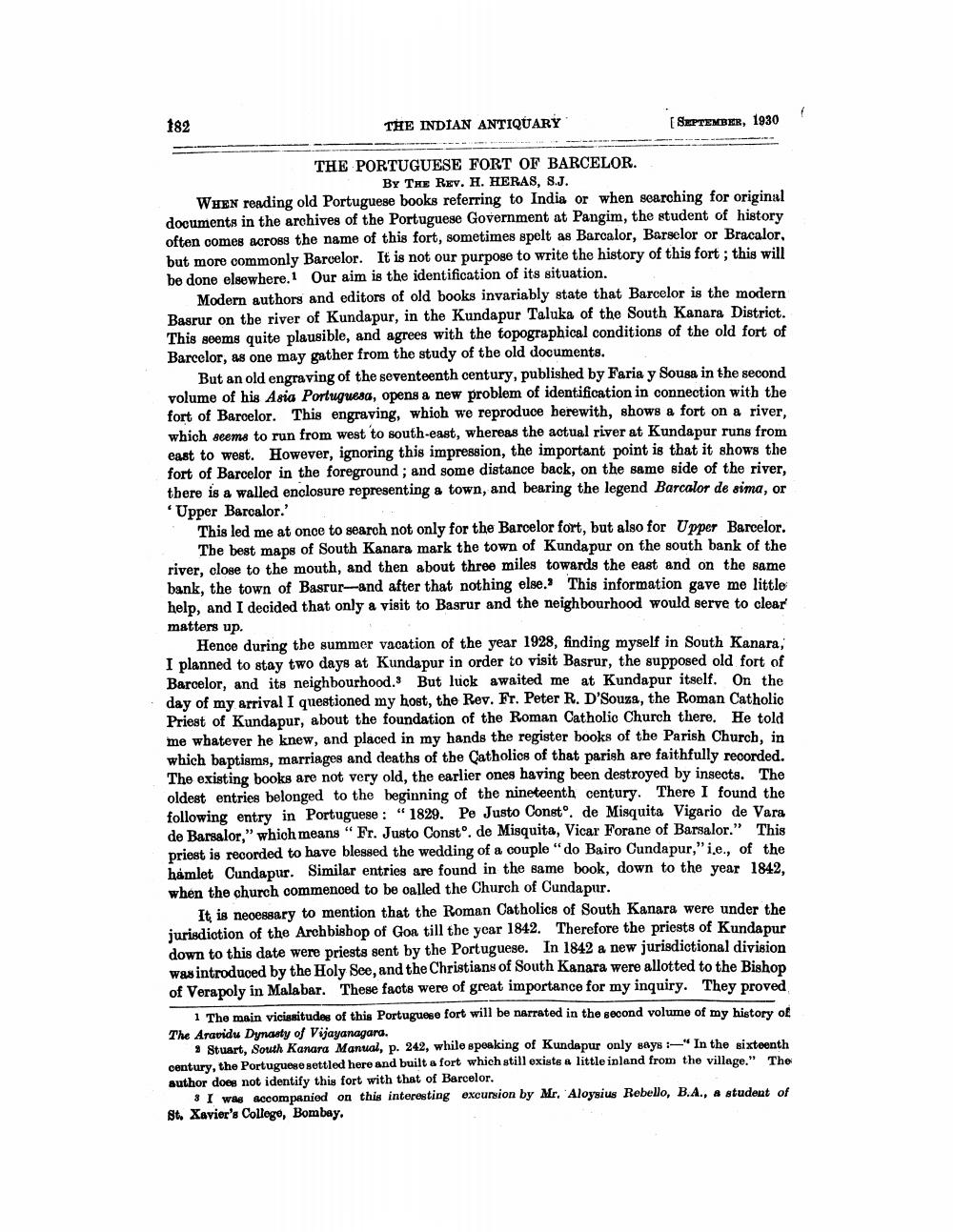________________
182
THE INDIAN ANTIQUARY
[SEPTEMBER, 1930
THE PORTUGUESE FORT OF BARCELOR..
BY THE REV. H. HERAS, S.J. WHEN reading old Portuguese books referring to India or when searching for original documents in the archives of the Portuguese Government at Pangim, the student of history often comes across the name of this fort, sometimes spelt as Barcalor, Barselor or Bracalor, but more commonly Barcelor. It is not our purpose to write the history of this fort ; this will be done elsewhere. Our aim is the identification of its situation.
Modern authors and editors of old books invariably state that Barcelor is the modern Basrur on the river of Kundapur, in the Kundapur Taluka of the South Kanara District. This seems quite plausible, and agrees with the topographical conditions of the old fort of Barcelor, as one may gather from the study of the old documents.
But an old engraving of the seventeenth century, published by Faria y Sousa in the second volume of his Asia Portuguesa, opens a new problem of identification in connection with the fort of Baroelor. This engraving, which we reproduce herewith, shows a fort on a river, which seems to run from west to south-east, whereas the actual river at Kundapur runs from east to west. However, ignoring this impression, the important point is that it shows the fort of Barcelor in the foreground, and some distance back, on the same side of the river, there is a walled enclosure representing a town, and bearing the legend Barcalor de sima, or Upper Barcalor.'
This led me at once to search not only for the Barcelor fort, but also for Upper Barcelor.
The best maps of South Kanara mark the town of Kundapur on the south bank of the river, close to the mouth, and then about three miles towards the east and on the same bank, the town of Basrur-and after that nothing else.' This information gave me little help, and I decided that only a visit to Basrur and the neighbourhood would serve to clear matters up.
Hence during the summer vacation of the year 1928, finding myself in South Kanara, I planned to stay two days at Kundapur in order to visit Basrur, the supposed old fort of Barcelor, and its neighbourhood. But luck awaited me at Kundapur itself. On the day of my arrival I questioned my host, the Rev. Fr. Peter R. D'Souza, the Roman Catholic Priest of Kundapur, about the foundation of the Roman Catholic Church there. He told me whatever he knew, and placed in my hands the register books of the Parish Church, in which baptisms, marriages and deaths of the Catholics of that parish are faithfully recorded. The existing books are not very old, the earlier ones having been destroyed by insects. The oldest entries belonged to the beginning of the nineteenth century. There I found the following entry in Portuguese : "1829. Pe Justo Const°. de Misquita Vigario de Vara de Barsalor," which means "Fr. Justo Const. de Misquita, Vicar Forane of Barsalor." This priest is recorded to have blessed the wedding of a couple "do Bairo Cundapur,"ie., of the hámlet Cundapur. Similar entries are found in the same book, down to the year 1842, when the church commenoed to be oalled the Church of Cundapur.
It is necessary to mention that the Roman Catholics of South Kanara were under the jurisdiction of the Archbishop of Goa till the year 1842. Therefore the priests of Kundapur down to this date were priests sent by the Portuguese. In 1842 a new jurisdictional division was introduced by the Holy See, and the Christians of South Kanara were allotted to the Bishop of Verapoly in Malabar. These facts were of great importance for my inquiry. They proved
The main vicissitudes of this Portuguese fort will be narrated in the second volume of my history o The Aravidu Dynasty of Vijayanagara.
9 Stuart, South Kanara Manual, p. 242, while speaking of Kundapur only says "In the sixteenth century, the Portuguese settled here and built a fort which still existe a little inland from the village." The author does not identify this fort with that of Barcelor.
I was accompanied on this interesting excursion by Mr. Aloysius Rebello, B.A., a student of St. Xavier's College, Bombay,




